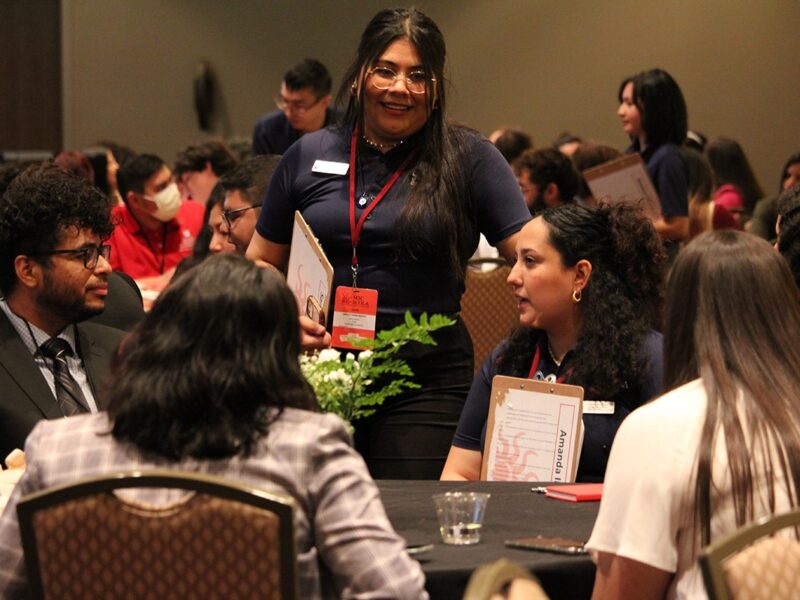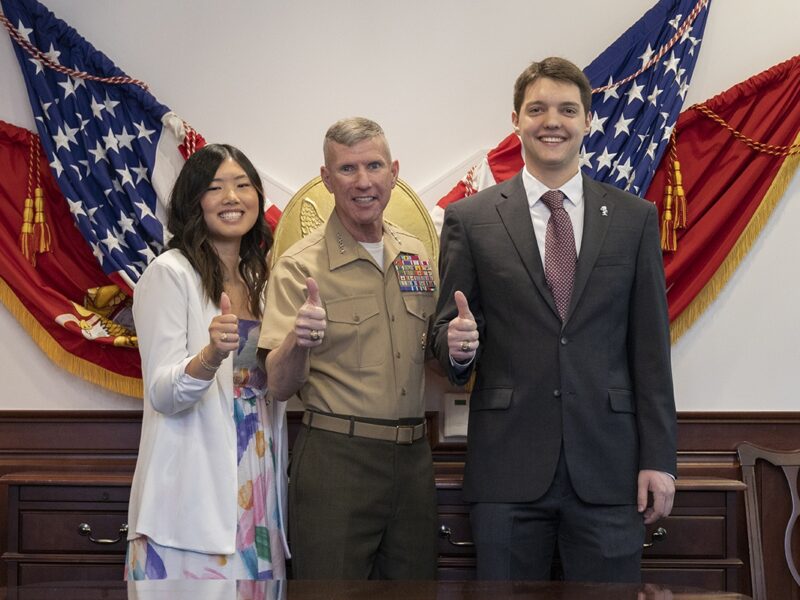On A High Note
 Drew Shelnutt ’11 knew nothing about the Singing Cadets when he arrived at Texas A&M University in fall 2009, but that changed following a trip to the local Good will. Browsing the aisles, the Virginia native noticed a glass ash tray with a blue, yellow and maroon shield—the official symbol of the Texas A&M Singing Cadets.
Drew Shelnutt ’11 knew nothing about the Singing Cadets when he arrived at Texas A&M University in fall 2009, but that changed following a trip to the local Good will. Browsing the aisles, the Virginia native noticed a glass ash tray with a blue, yellow and maroon shield—the official symbol of the Texas A&M Singing Cadets.
Gifted with an exceptional bass vocal range, Shelnutt’s interest sparked. He bought the ashtray for a couple of dollars, not knowing why he felt a connection to it but certain that it meant something. A few days and a short rendition of “My Country ‘Tis of Thee” later, he landed a spot in Texas A&M’s premier men’s chorus. Now president of the Singing Cadets, Shelnutt leads by example to foster the spirit of brotherhood that characterizes the organization.
“The relationships we build in this group are truly incredible,” Shelnutt said. “We aren’t just about building friend ships, but about building character—and the two always seem to go together.”
The Texas A&M Singing Cadets have captivated audiences across the nation as skilled masters of music and men of character for 109 years. As grounded in tradition as the songs they sing, the 63 members of this collegiate ensemble belt out sacred hymns as aptly as modern-day medleys—and they never miss a beat.
RENOWNED REPUTATION
The Singing Cadets are the most-performing college chorus in the United States with more than 70 musical presentations each year across Texas and the nation.
The Singing Cadets at a performance with President George H.W. Bush, Kipp and Texas A&M President R. Bowen Loftin.
And their reputation precedes them. The Singing Cadets’ history includes performances for U.S. presidents, foreign ambassadors, congressmen, state governors and Texas A&M presidents at venues ranging from Carnegie Hall to the White House to St. Paul’s Cathedral in London.
“We’ve been afforded window after window of opportunity that no other organization in the history of Texas A&M has experienced,” said David Kipp, director of the Singing Cadets for the past 18 years. “And every performance, no matter how impressive the venue for whom we are singing, has one purpose.”
That purpose, on which the group was founded, is to enhance the public relations of Texas A&M through musical presentations. The group achieves this aim by staying with host families during tours, which provides opportunities to spread awareness of Texas A&M and its traditions.
First-year cadets learn a number of pointers to aid them in host homes—don’t talk politics, make your bed and leave the bathroom clean. Following a stay, each member handwrites a thank-you note to instill a habit of expressing appreciation.
“We positively impact people all over the world—as close as Allen, Texas, or as far away as Australia. If we get someone to think a little better about the United States, about the state of Texas, or about Texas A&M University, we’ve achieved our purpose,” Kipp said.
Every three years, international tours give the Singing Cadets the opportunity to spread awareness of Texas A&M on a global scale. Kipp carefully selected this year’s music in preparation for a tour to China in May, where the group is slated to perform at the finest concert halls in four cities: Beijing, Xi’an, Hangzhou and Shanghai. The group’s repertoire includes upbeat music either written or originally performed by male groups—from revered classics to medleys from the Jersey Boys and The Temptations to songs of the Old West.
PRIDE IN PERFORMING
Although the students are capable of executing any music genre, their typical concert pairs Aggie songs with sacred pieces, Broadway selections and the most requested song, “God Bless the USA.” Echoes from one performance of “God Bless the USA” still resound for third-year member Shelnutt.
“Last year we had the opportunity to perform at a veterans’ hospital in front of nearly 100 former students and Aggie supporters who served our country,” Shelnutt said. “At the end of the performance, I watched a group of men and women in wheelchairs put all of their effort into standing as we sang “God Bless the USA.” It was an incredible display of pride, and I felt so blessed to have been able to perform for them.”
Shelnutt has just as much pride in the Singing Cadets, an organization which he says instills the value of service above self and shapes individuals into leaders of character. A second-year doctoral student in the Urban and Regional Sciences Program in the College of Architecture, Shelnutt is an experienced leader. As an under graduate, he served as student body president at George Mason University, and he is now director of the 2013 Southeastern Conference Leadership Exchange.
“I try to lead by example so that new members learn what is expected of them and how they can manifest those values in their everyday lives,” Shelnutt said. “We have always been an organization that sets high standards and expects every member to act in accordance—that is what makes each Singing Cadet so proud to be a member of this group.”
The same sense of pride is shared by former Singing Cadets who maintain ties with the group, such as Fred McClure ’76, chief executive officer of the George Bush Presidential Library Foundation. McClure participated in the Singing Cadets for more than two years as a second tenor before he was elected the first African-American student body president of Texas A&M in 1976.
“I loved the camaraderie of the group, the great music we performed and the chance to represent Texas A&M,” McClure said. “I learned the value of teamwork in achieving a shared goal. Organizations like this that represent our university and provide leadership opportunities for our students deserve our highest support.”
THE MUSIC MUST GO ON
The group receives funding through university advancement fees to cover operational expenses, but as travel expenses continue to rise and university funding remains flat, the Singing Cadets increasingly rely on outside funds.
Because the group performs internationally every three years, its annual resources are limited for Texas and U.S. tours. Kipp would like to take the Singing Cadets on one major national tour every year, but lacks the funds to do this without endangering the international travel.
Funds from six endowments through the Texas A&M Foundation directly benefit the Singing Cadets for purchasing uniforms or financing tours.
In honor of David Kipp and the Singing Cadets, Patricia and Glendale Rand ’57 established an endowment in 2008 to help recruit new members and to provide financial support to those in need. In 2011 they created a second endowment to help purchase new uniforms for the Singing Cadets as they are needed.
Despite relocating 17 times, the Rands call Aggieland home and reserve a special place in their hearts for the Singing Cadets.
“The Singing Cadets leave such a great impression on the university, and our gifts honor this tradition,” Glendale Rand said. “Our endowments also publicly recognize the exemplary service, leadership and overall performance of David Kipp, and we hope they will be a lasting benefit to our beloved Singing Cadets.”
Private gifts like those from the Rands enable the Singing Cadets to be so much more than just a “singing class that performs at Texas A&M,” said Kipp. “With gifts to the Texas A&M Foundation to support the Singing Cadets, donors directly benefit students of Texas A&M and expand our opportunities. These gifts are applied to real students making a difference at the university.”
Mike Connor ’85 and his wife Diana support the Singing Cadets with a unique endowment known as the “Aggie Ring Incentive.”
Established in 2005 in an initial amount of $25,000, the Diana and Michael H. Connor ’85 Singing Cadet Aggie Ring Endowment funded through The Association of Former Students, provides financial support for qualifying Singing Cadets who are purchasing Aggie Rings.
“A few years before we set up the endowment, one of the Singing Cadets lost his Aggie Ring,” said Mike Connor, a Singing Cadet from 1983 to 1985. “Because he could not afford a replacement, the other guys in the group pooled their money and bought him a new one. We were inspired by that selfless act of giving and wanted to set up a mechanism to remove future financial barriers to a Singing Cadet getting his Aggie Ring.”
The endowment has covered 41 Singing Cadet rings since 2005. The Connors have added to their initial endowment and a provision in their bequest further promises to cover the cost of 12 ring supplements per year.
Other donors, like Thomas and Beverly Rogers, see the virtue in honoring an organization’s leader. Through a $25,000 gift to the Memorial Student Center Renovation and Expansion Project, they chose to name the choral activities director’s office the “Jeannie and David Kipp Choral Activities Director’s Office” in honor of Kipp and his wife.
“Our sons, Robert ’12 and John ’15, have had the privilege of participating in this organization, and we thought it important to recognize David Kipp’s leadership and his ability to shape young men of grace and integrity,” Beverly Rogers said. “This organization is part of Texas A&M’s backbone, and we have the responsibility to give back.”
Gifts like these show a heartfelt desire to support a student organization that is the perfect example of the “other” education—teaching leadership, responsibility, dedication, valuable social skills and self-confidence.
Most important, the organization gives its members a voice that sounds above the noise of thousands of students.
And Shelnutt, who spent two dollars on an ashtray, says he’s never received a better return on his investment.





